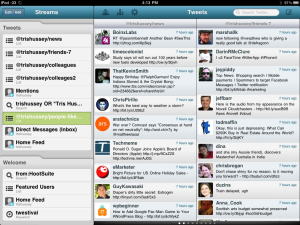This is a guest post by Thomas Phillip Gleeson, an assistant professor in the civil engineering department at McGill University.
Is anyone else overwhelmed by updating their many webpages, blogs, streams etc?
Jason Priem described the shift from a paper-native academia to a web-native academia, in an excellent article last year in Nature, a shift well beyond the traditional peer-reviewed journal to more diverse outlets of information, interaction and discussion. I am part of the first generation of researchers who are excited to use social media but we need more and better tools to make social media work even better for ourselves and others. Something like HootSuite for Prof 2.0!
I love Hootsuite, a dashboard for managing various social media profiles (Twitter, Facebook etc.) in one handy place, across multiple platforms (phone, computer, tablets etc.).
We need something similar to manage the various facets of academic life. Just to give you some idea, these are all the pages and sites I try to maintain: a personal research webpage, this Water Underground blog, a Twitter feed, a LinkedIn profile, Google Scholar, a ResearchGate page, a ResearcherID page, a Vimeo account and Groundwater footprint. I am happy to do this but it can be overwhelming in the midst of the other pulls of academic life – and I don’t even use Facebook!
Ideally, this new platform would be a simple, user-friendly, open-source dashboard that would integrate various social media outlets academics use, plus be a simple place to update citations. A great and relatively simple first step would be a single place to update reference lists, which are a crucial part of how academics are evaluated so it is useful to keep them updated. Currently, my references are listed on Google Scholar, ResearchGate, ResearcherID, as well as a couple university webpages. It would be great to be able to export citations (already in standard formats like EndNote or BibTeX) and have these citations populate and update all my reference lists. I know Google Scholar already does this automatically (and usually correctly) but it would be great for consistency across outlets.
It would be great to link all kinds of altmetrics with this simple, social professor dashboard. Altmetrics are alternative metrics to the widely-used journal impact factor and personal citation indices like the h-index. An aggregate metric is calculated from how much as article, person, event (or blog post – subtle hint!) is viewed, discussed, saved, cited or recommended. As Priem writes, altmetrics will “draw new maps of scholarly contribution, unprecedented in subtlety, texture and detail.” And I find this to be already true – I often follow meandering altmetrics paths from a scientific article to news articles or discussions about the scientific article, and then I use this to enrich blog posts or tweets.
I flit across the web throughout my day and week – this dashboard would help me stay grounded and organized on the web. When I publish a new article, I would automatically update it in the various the places listing my citations, then write a quick tweet about it, check for news articles about it etc. Or I may see a comment on LinkedIn about a scientific article that could be useful for a paper I am writing. The comment in one column of the dashboard would be linked to the article, and the PDF posted on ResearchGate may be in another column of the dashboard. I take the PDF, export the citation to my library and pop it into the paper I am working on, in a series of smooth, integrated steps.
This HootSuite for Prof 2.0 could be a simple tool to enable the shift from a paper-native academia to a web-native academia by leveraging and extending information, interaction and discussion.
